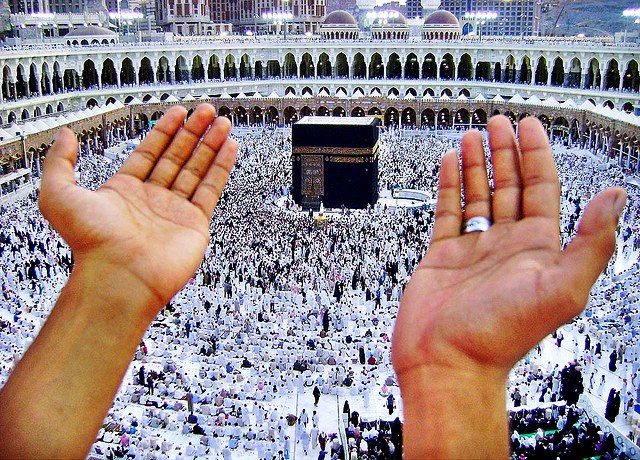
A very special and a unique guest is at our doorstep. A guest that will bring abundance of mercy and forgiveness of the Almighty to us, a guest that will draw the believer more closer to Allah and will keep him away from satan and his evils, a guest that will instil the spirit of kindness, sympathy, charity and generosity in us, a guest that will compel us to have a closer introspection of our life and rectify the mistakes thereby. This honourable guest is none other than the holy month of Ramadan, that comes every year as a reminder and a re-enforcer.
About fourteen hundred and thirty years ago a declaration came from Prophet Muhammad (peace be upon him) while he was addressing a gathering in Madinah at the onset of the month of Ramadan. It was a declaration that carried enormous glad tidings for the believers. The Prophet (peace be upon him) said, "Oh people! A great month has come over you; a blessed month, a month in which is a night better than a thousand months, month in which Allah has made it compulsory upon you to fast by day, and it is voluntary to pray during the night. Whoever draws nearer (to Allah) by performing any of the good deeds in this month shall receive the same reward as performing an obligatory deed at any other time, and whoever discharges an obligatory deed in this month shall receive the reward of performing seventy obligations at any other time. It is the month of patience, and the reward of patience is Heaven. It is the month of charity, and a month in which a believer's sustenance is increased. Whoever gives food to a fasting person to break his fast, shall have his sins forgiven, and he will be saved from the Fire of Hell, and he shall have the same reward as the fasting person, without his reward being diminished at all.”
Every year the month of Ramadan comes with loads of blessings and manifold rewards for our deeds. It comes as a trainer to train and remind the believer about self control, selflessness, mutual empathy and moral values. It rejuvenates and rebuilds the spiritual strength of a believer. It brings along with it the beautiful days of fasting and the fragrant nights of worship. It is the season for goodness and virtues when righteousness blooms throughout the Muslim communities around the world.
Instilling the quality of Taqwa (God Consciousness, self restraint and piety) is the primary objective of fasting. The Qur’an says “Believers, fasting is enjoined upon you as it was enjoined upon those before you that you may attain Taqwa” (Qur’an 2:183). A believer abstains from food, drink and conjugal relationship from dawn to sunset thereby exhibiting the zeal of willpower and self control. But Fasting is more than merely foregoing food and water. Prophet Muhammad (peace be upon him) has emphasized on the true dimension of fasting by saying “Whoever did not give up lying and practicing falsehood, Allah is in no need of his giving up food and water”.
Therefore the real essence of fasting is keeping one's ears, eyes, tongue, hands and feet and all other organs free from sin. Being aloof from idle talk, rude words, lying, gossiping, argument and controversy fulfils the real intention of fasting. Patience is another lesson taught through fasting because Prophet Muhammad (Peace be upon him) has advised the fasting person to respond to adversity by saying: "Fasting is like a shield against bad deeds. Therefore, (while fasting,) a person should neither involve himself in lewdness nor lose his temper. If someone tries to get him involved in a fight, he should say: 'I am fasting' [and, thus, avoid fighting)”
Ramadan is the month when the Qur’an, which is the book of guidance to the entire mankind was revealed. Allah says, "The month of Ramadan in which was revealed the Quran, a guidance for mankind and clear proofs for the guidance and the Criterion (between right and wrong). So, whoever of you sights the month, he/she must observe fasts”. (Qur’an,2:185). Therefore it is important to spend the month in reciting the Qur’an and contemplating on the meaning of its verses. It is equally important to inculcate the teachings of the Quran in our life and strive in the way of spreading its message to the entire humanity.
It is indeed a matter of concern if one returns to sinning and evildoing after this strenuous training program in the month of Ramadan. It should be remembered that the lord of Ramadan is the lord of other months too and after showing the utmost obedience to the Almighty in Ramadan all good deeds will go vain if the spirit of obedience does not continue throughout the rest of the year. Wishing you all a blessed month of Ramadan.









Comments
Possui mais de 6 anos de experiência em Marketing and advertising Digital,
principalmente com foco no universo B2B, ocupando atualmente ao cargo de Diretor na WebSpace Marketing e Estratégias
Digitais.
Also visit my weblog :: Digital Web Marketing: http://amprom.org/?option=com_k2&view=itemlist&task=user&id=818200
Add new comment